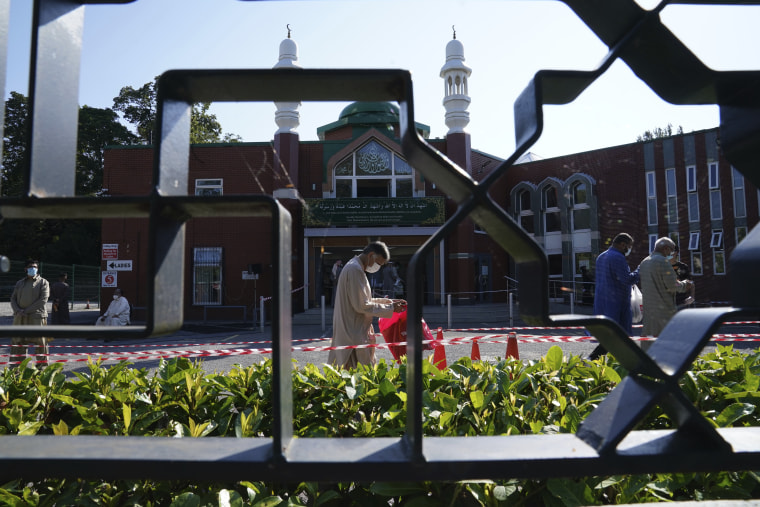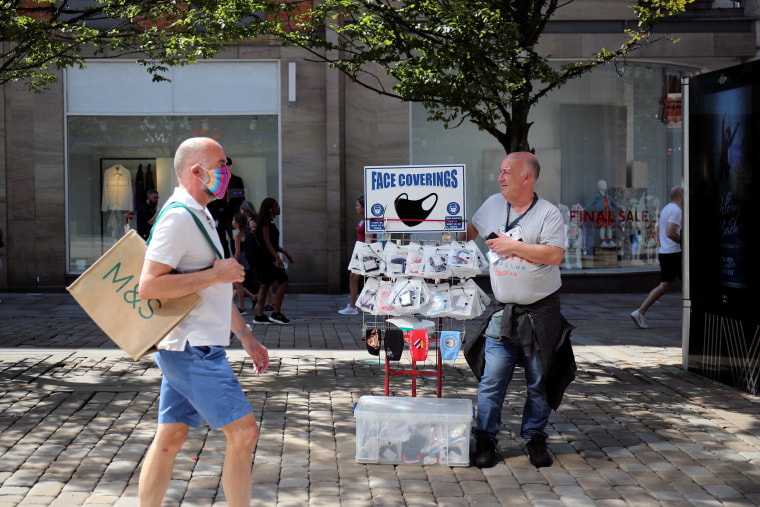LONDON — The United Kingdom reintroduced new coronavirus restrictions in parts of northern England on Thursday amid a spike in cases, which is also occurring across Europe and Asia, stoking fears of a second wave.
“I am worried about a second wave. I think you can see a second wave starting to roll across Europe," U.K. Health Secretary Matt Hancock told British broadcaster Sky News, which like NBC News is owned by Comcast Corp.
The U.K. reported 846 new positive cases on Thursday — the highest number of daily infections since June 28.
Over 4 million people in Greater Manchester, the largest urban region in northern England, and other parts of the region are once again under tighter lockdown measures. They've been ordered not to mix with other households, although they can still go to the pub and to work.
“The problem with this virus is that it thrives on the social contact which makes life worth living,” Hancock told Sky. “I totally understand the human impact of this but unfortunately that is how the virus passes on.”
Prime Minister Boris Johnson announced Friday that plans to reopen high-risk public spaces — such as casinos, theaters and sports venues — on Aug. 1 will be postponed until at least Aug. 15.
"I have said our plan to reopen society and the economy is conditional," Johnson said at a news conference. "With those numbers creeping up, our assessment is that we should now squeeze that break pedal ... in order to keep the virus under control."
The requirement to wear face coverings in shops will also be extended to other public venues such as museums and cinemas, he said.
Worldwide, the number of coronavirus cases has topped 17.3 million, according to Johns Hopkins University. Over 673,000 people have died.
Elsewhere in Europe, Germany reported 902 new cases on Thursday — an increase the Robert Koch Institute, which is tracking the country's data, called "concerning." Another 870 cases were reported on Friday.
At least one of the outbreaks in the country is linked to agricultural workers in the Bavarian district of Dingolfing-Landau, forcing one company to quarantine its employees, the institute said.

Meanwhile, Germany has also joined Britain in implementing stricter travel regulations on people arriving from parts of Spain.
The U.K.'s move to require travelers from Spain to quarantine for 14 days was announced last weekend with immediate effect after the country reported a number of outbreaks, causing havoc for Britons there on vacation.
On Thursday, Spain’s health ministry reported the biggest daily jump in new cases since the lockdown ended with more than 1,000 new infections for the second consecutive day.
The United States, in comparison, saw an increase of roughly 58,000 confirmed cases in 24 hours between Thursday and Friday, according to NBC News' count.
There have also been spikes in coronavirus cases across Asia.
In Japan, 463 new cases were reported in the capital Tokyo on Friday, adding to the 367 new cases reported the previous day.
The city's government is now asking restaurants and bars to shorten their opening hours through August in an effort to limit the spread. A system of stickers has also been introduced to highlight restaurants and shops that are safe for the public to enter.
"Our life has changed. Our lifestyle has changed. So our behaviors need to change, too," said Tokyo Governor Yuriko Koike.
Koike warned that if the situation worsens, she may call a regional state of emergency, although it would not be as restrictive as previous measures taken in order to keep the economy going.
Vietnam's health ministry reported its highest daily increase since cases first emerged in January with 45 new infections confirmed on Friday. It threatens the country's impressive track record in containing the virus.
No coronavirus deaths have yet been reported in Vietnam, and before the reemergence of the virus this week, the country had recorded 100 days without a locally transmitted case.
Hong Kong reported another 3,151 new cases on Friday. It follows warnings from Chief Executive Carrie Lam earlier this week that the territory was on the verge of a significant outbreak.
The territory was initially praised for weathering the first two waves of the pandemic. A surge in cases that began earlier this month prompted new restrictions, including mandatory masks both indoors and outdoors.
The United States remains the worst-affected country with nearly 4.4 million cases and over 150,000 deaths, according to NBC News's tracker.
Reuters contributed to this report.

